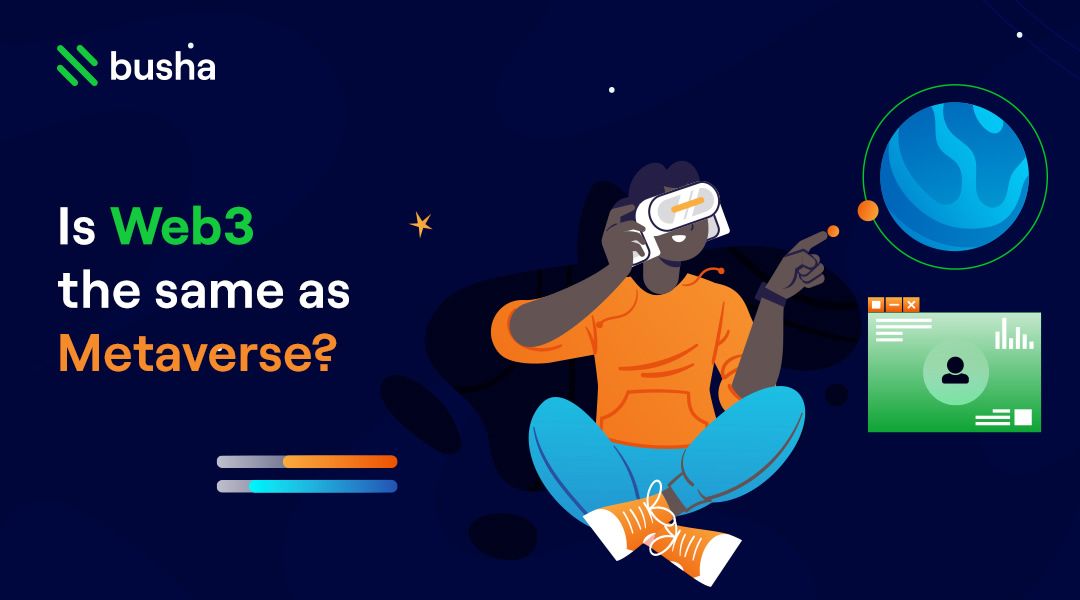
Is Web3 the same as Metaverse?
Hi, I’m Dami. I’m learning daily about Web3 and the Metaverse, and I want to let you in on a thing or two.
If you have not heard these two words - Web3 and Metaverse at one point or the other in the past year then I have bad news. 😂 Just kidding, come along, I’ll let you in on all the scoop and break it down. These words have been the rave of the moment in the tech world, going on two years now, and for people who have heard of them, a common misconception is that they mean the same thing. Well, they are related, but these are two words that describe different concepts.
Keep reading and let’s unravel the mystery that is Web3 and the Metaverse, together.
What is Web3?
Simply put, web3 is the decentralised version of the internet as we know it – decentralised web. It is built on blockchain and decentralised autonomous organisations (DAO) technologies, rather than servers owned by individuals or corporations. (I wonder why this sounds familiar. Right, cryptocurrency!). Web3 serves to strip these entities of the control they have over a network (due to ownership of the hardware it is run on) and hand it over to the users. This means that the networks where applications are run from and where data is stored will be owned by the users themselves, who will have voting rights over what rules and regulations are in place, and how they can be used. Basically, a democratised internet. It is thought that this will be the third major evolution of the internet, the first and second being the worldwide web (web1) and the user-generated web a.k.a social media (web2) respectively.
What is Metaverse?
Metaverse on the other hand, is another name for virtual worlds, where users can interact with each other and engage with apps and services in a far more immersive way. There have been so many books and movies centred around the metaverse idea, novels like Neal Stephenson’s Snow Crash, where the term “metaverse” was mentioned for the first time, and Ready Player One, which was later adapted in a movie (have you seen that movie? No spoilers, but you totally should). Other metaverse movie adaptations’ include Matrix (a classic!) and more recently Free Guy. I know it feels like we’re talking a lot about movies, but hey, what better way to understand this awesome concept than by simply learning while enjoying the best blockbusters? Yuhh! Okay, back to earth. The term Metaverse is used today to refer to any online space(s) that strive to create immersive environments. So games like Fortnite, which have been used as a venue for virtual concerts, and Roblox, which offers businesses the chance to build branded worlds, are also considered to be metaverse experiences. Well, let’s just say that reality is fast catching up with science fiction. Some have even predicted that by 2030 we will be able to enter into virtual worlds that appear to be completely real. That’s pretty cool if you ask me.
Web3 and Metaverse
I know what you’re thinking. If web3 and metaverse are so different then how come they’re sometimes spoken of as the same thing? Well, this is because they are related in many important ways, as you are about to discover.
It is important to bear in mind that despite my earlier statements where I tried to breakdown Web3 and Metaverse, no one is really entirely sure exactly what either of them is yet, and both the decentralised web (web3) and metaverse have been, at one time or another, referred to as web 3.0 – the third major evolution of the internet. They are still kind of "under construction" by many different people and organisations who all have different ideas about what they will look like when they're finished. In 2021 for example, Meta (formerly Facebook) said it would spend at least $10 billion on developing the concept of a metaverse, but its vision of what the metaverse will be is very different to those who believe the metaverse should be decentralised and outside of the control of big corporations – like Meta.
Also, some people have described web 3.0 as “the immersive web” – a new generation of the web which is primarily differentiated from what existed previously. Remember where else we’ve used that word “immersive”? The Metaverse!
Another reason web3 and metaverse are related and often conflated with each other is that they are somewhat complementary in their usage. The technology used to build web3 – which includes blockchain, and blockchain-based cryptocurrencies like Bitcoin and Ethereum, and NFTs – all have huge implications for the way we will make use of the virtual worlds of the metaverse, for work, play, socialising and learning.
I’m sure now you know how and why web3 and metaverse, although closely related, are fundamentally different concepts (at least basically).
It’s a brave new world, indeed.